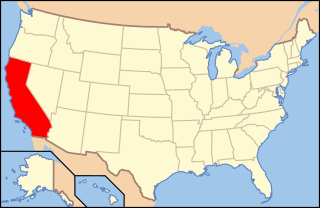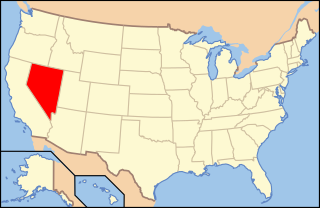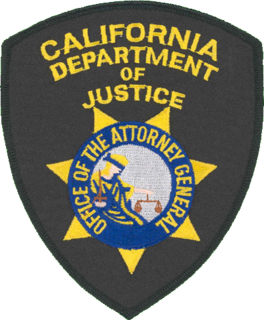
Proposition 54 was a California ballot proposition on the October 7, 2003 gubernatorial recall election ballot. It failed to pass with 3,144,145 (36.1%) votes in favor and 5,541,314 (63.9%) against. It was placed on the ballot through the initiative process.
Proposition 2 was a referendum for a state constitutional amendment placed on the ballot by the Texas legislature and approved by the voters at the November 8, 2005 general election. The measure added a new provision to the Texas Constitution, Article 1, Section 32, which provides that "Marriage in this state shall consist only of the union of one man and one woman", and "This state or a political subdivision of this state may not create or recognize any legal status identical or similar to marriage." Texas thus became the nineteenth US state to adopt constitutional amendment banning same-sex marriage. It was the most populous state to adopt a constitutional ban on same-sex marriage until California passed its ban in November 2008.

Proposition 4, or the Abortion Waiting Period and Parental Notification Initiative, also known to its supporters as Sarah's Law, was an initiative state constitutional amendment on the 2008 California General Election ballot

Gun laws in California regulate the sale, possession, and use of firearms and ammunition in the state of California in the United States.

The November 2005 San Francisco general elections were held on November 8, 2005, in San Francisco, California. The elections included eight California ballot propositions as part of a special election, those for San Francisco assessor-recorder, city attorney, and treasurer, and nine San Francisco ballot measures.

Gun laws in Nevada regulate the sale, possession, and use of firearms and ammunition in the state of Nevada in the United States.

Proposition 30, officially titled Temporary Taxes to Fund Education, is a California ballot measure that was decided by California voters at the statewide election on November 6, 2012. The initiative is a measure to increase taxes to prevent US$6 billion cuts to the education budget for California state schools. The measure was approved by California voters by a margin of 55 to 45 percent.
A high-capacity magazine ban is a law which bans or otherwise restricts high-capacity magazines, detachable firearm magazines that can hold more than a certain number of rounds of ammunition. For example, in the United States, the now-expired Federal Assault Weapons Ban of 1994 included limits regarding magazines that could hold more than ten rounds. Eight U.S. states, and a number of local governments, ban or regulate magazines that they have legally defined as high-capacity. The majority of states (42) do not ban or regulate any magazines on the basis of capacity. States that do have large capacity magazine bans or restrictions typically do not apply to firearms with fixed magazines whose capacity would otherwise exceed the large capacity threshold.

Maine Question 3, formally An Act to Require Background Checks for Gun Sales, was a citizen-initiated referendum question that appeared on the Maine November 8, 2016 statewide ballot. It sought to require a background check for virtually all gun transfers in Maine, with some exceptions. As the Maine Legislature and Governor Paul LePage declined to enact the proposal as written, it appeared on the ballot along with elections for President of the United States, Maine's two United States House seats, the Maine Legislature, other statewide ballot questions, and various local elections.
Public opinion on gun control in the United States has been tracked by numerous public opinion organizations and newspapers for more than 20 years. There have also been major gun policies that affected American opinion in the 1990s. Throughout these polling years there are different gun control proposals that show promise for bipartisan action. Over the years listed there have been major tragedies that have affected public opinion. Most of the tragedies are school shootings. There have also been a growth in states around the United States taking more drastic measures on gun control. As of late February and early March 2018, a majority of Americans support stricter gun laws, including wide support for universal background check and mandatory waiting periods for gun purchases and including support for banning assault weapons, adding felons and mental illness patients to background check systems, and prohibiting sales of guns to persons under 21 years old.

Proposition 51 is a California ballot proposition that passed on the November 8, 2016 ballot, regarding $9 billion in bonds to fund construction and improvement of K-12 and community college facilities. The measure designates $7 billion for K-12 projects falling under four types of projects, and $2 billion for any facility project for community colleges. No other bond measures related to education have been on the California ballot since 2006.

Proposition 53 was a California ballot proposition on the November 8, 2016 ballot. It would have required voter approval for issuing revenue bonds exceeding $2 billion.

Proposition 55 is a California ballot proposition that passed on the November 8, 2016 ballot, regarding extending by twelve years the temporary personal income tax increases enacted in 2012 on earnings over $250,000, with revenues allocated to K–12 schools, California Community Colleges, and, in certain years, healthcare. Proposition 55 will raise tax revenue by between $4 billion and $9 billion a year. Half of funds will go to schools and community colleges, up to $2 billion a year would go to Medi-Cal, and up to $1.5 billion will be saved and applied to debt.

Proposition 56 is a California ballot proposition that passed on the November 8, 2016 ballot. It increased the cigarette tax by $2.00 per pack, effective April 1, 2017, with equivalent increases on other tobacco products and electronic cigarettes containing nicotine. The bulk of new revenue is earmarked for Medi-Cal.

Proposition 61 was a California ballot proposition that appeared on the November 8, 2016 ballot. It would have prohibited the state of California from buying any prescription drug from a drug manufacturer at price over the lowest price paid for the drug by the United States Department of Veterans Affairs. It would have exempted managed care programs funded through Medi-Cal. According to the fiscal impact statement issued by California Legislative Analyst's Office, "potential for state savings of an unknown amount depending on (1) how the measure’s implementation challenges are addressed and (2) the responses of drug manufacturers regarding the provision and pricing of their drugs."

Proposition 62 was a California ballot proposition on the November 8, 2016, ballot that would have repealed the death penalty and replaced it with life imprisonment and forced labor without possibility of parole. It would have applied retroactively to existing death sentences and increased the portion of life inmates' wages that may be applied to victim restitution.

California state elections in 2018 were held on Tuesday, November 6, 2018, with the primary elections being held on June 5, 2018. Voters elected one member to the United States Senate, 53 members to the United States House of Representatives, all eight state constitutional offices, all four members to the Board of Equalization, 20 members to the California State Senate, and all 80 members to the California State Assembly, among other elected offices.

California Proposition 6 was a measure that was submitted to California voters as part of the November 2018 election. The ballot measure proposed a repeal of the Road Repair and Accountability Act, which is also known as Senate Bill 1. The measure failed with about 57% of the voters against and 43% in favor.


















